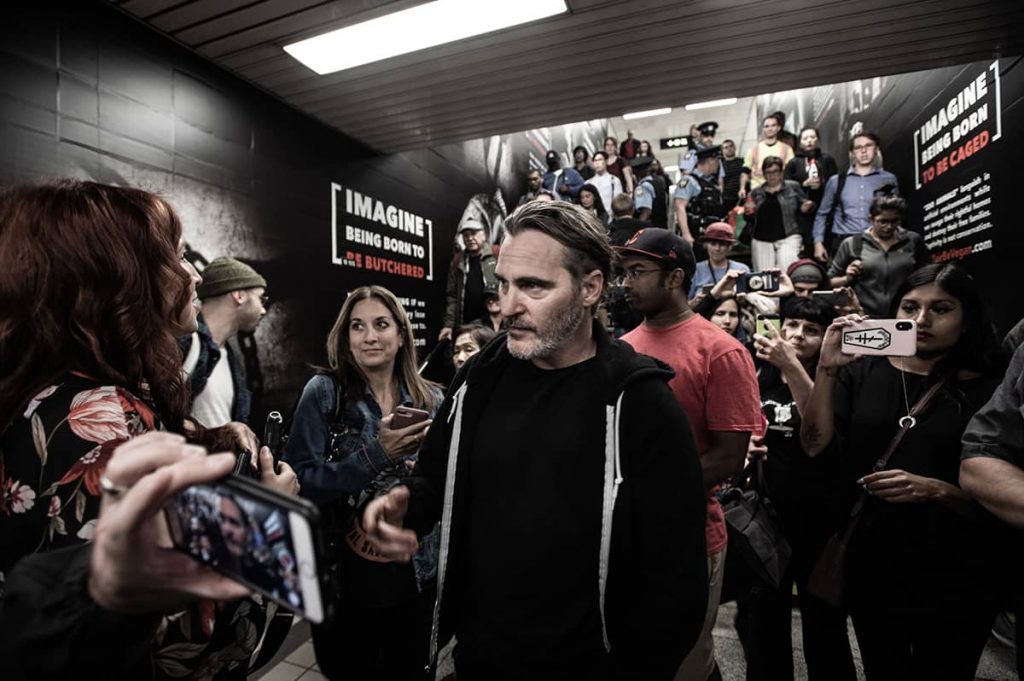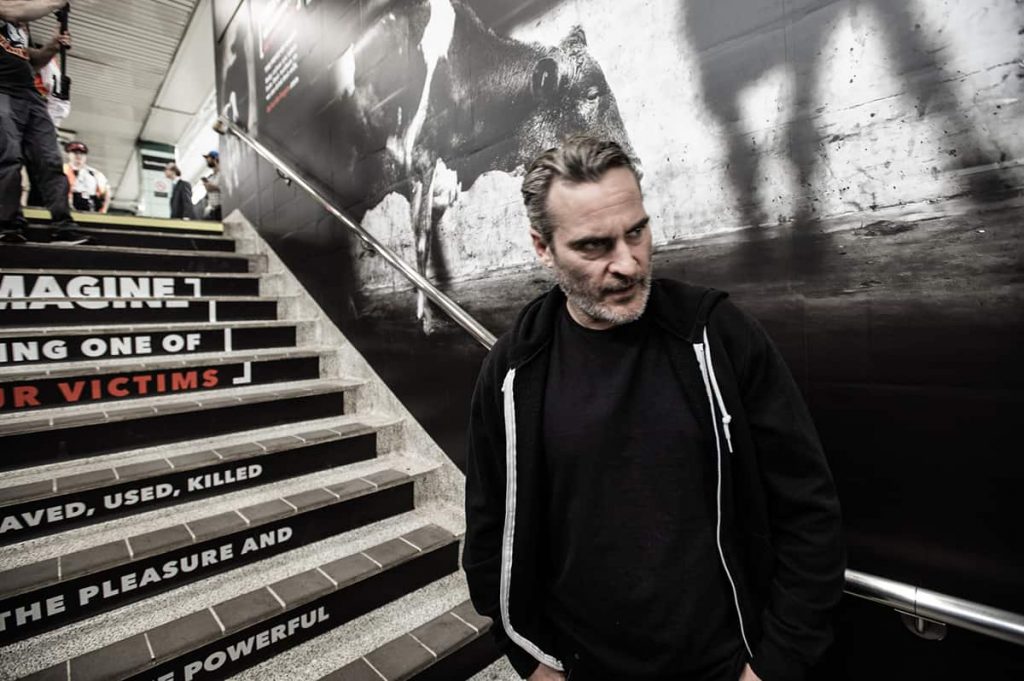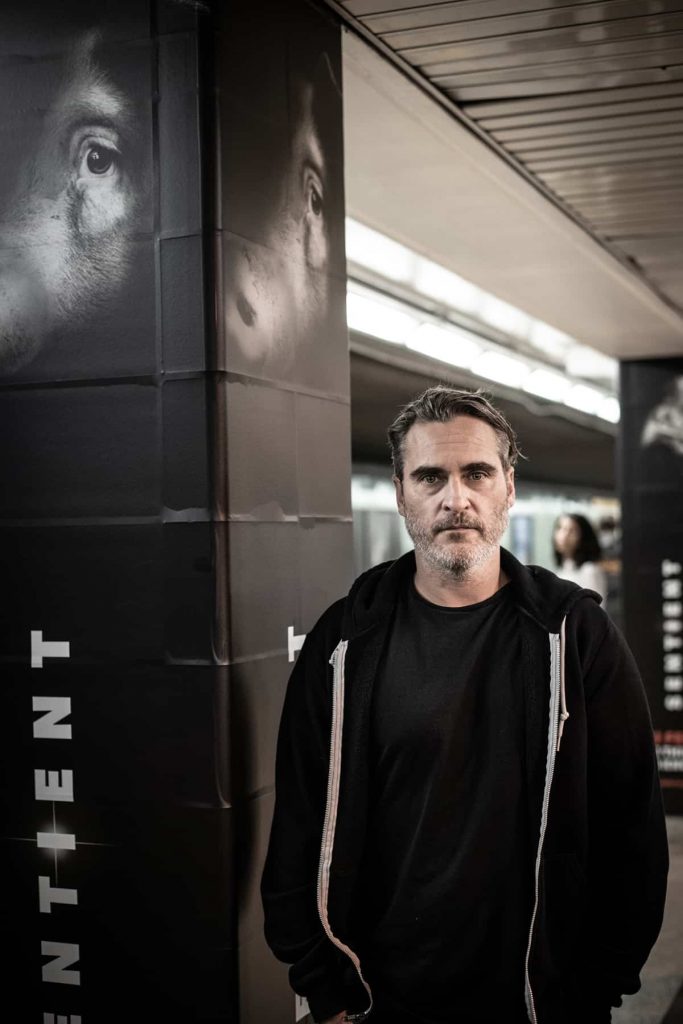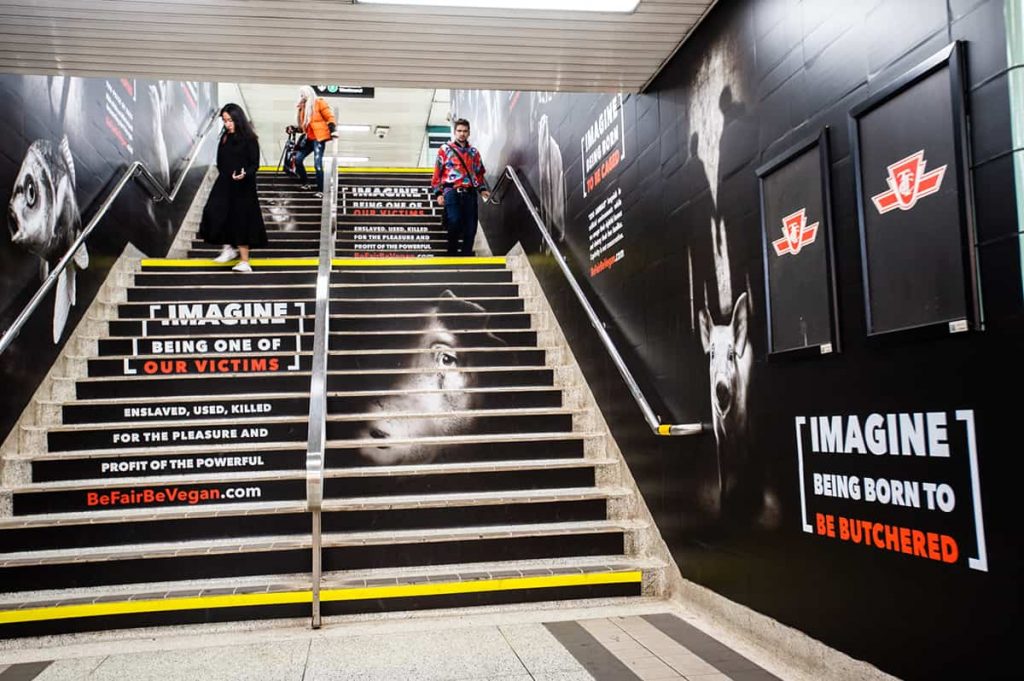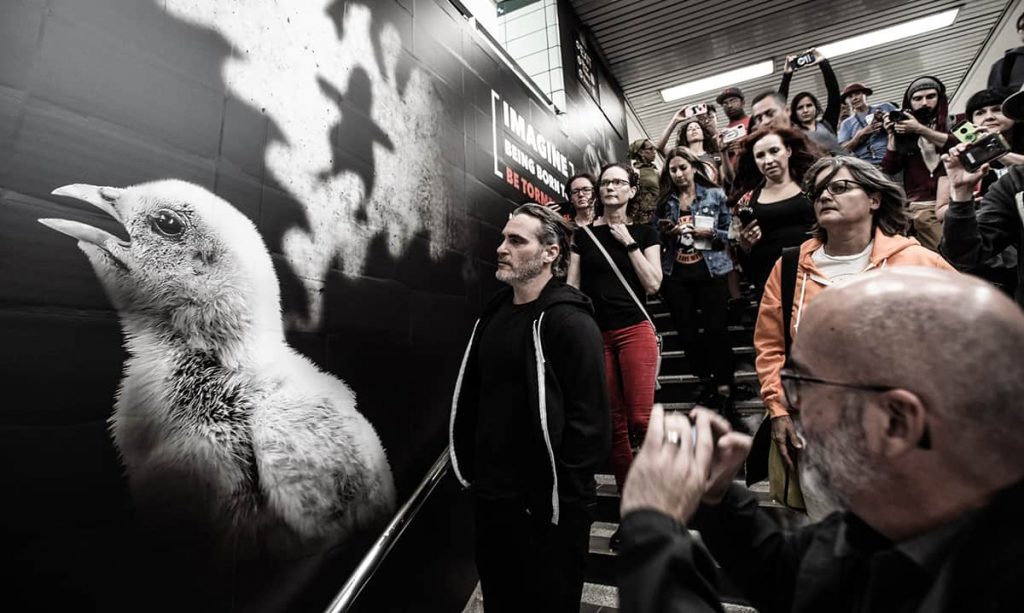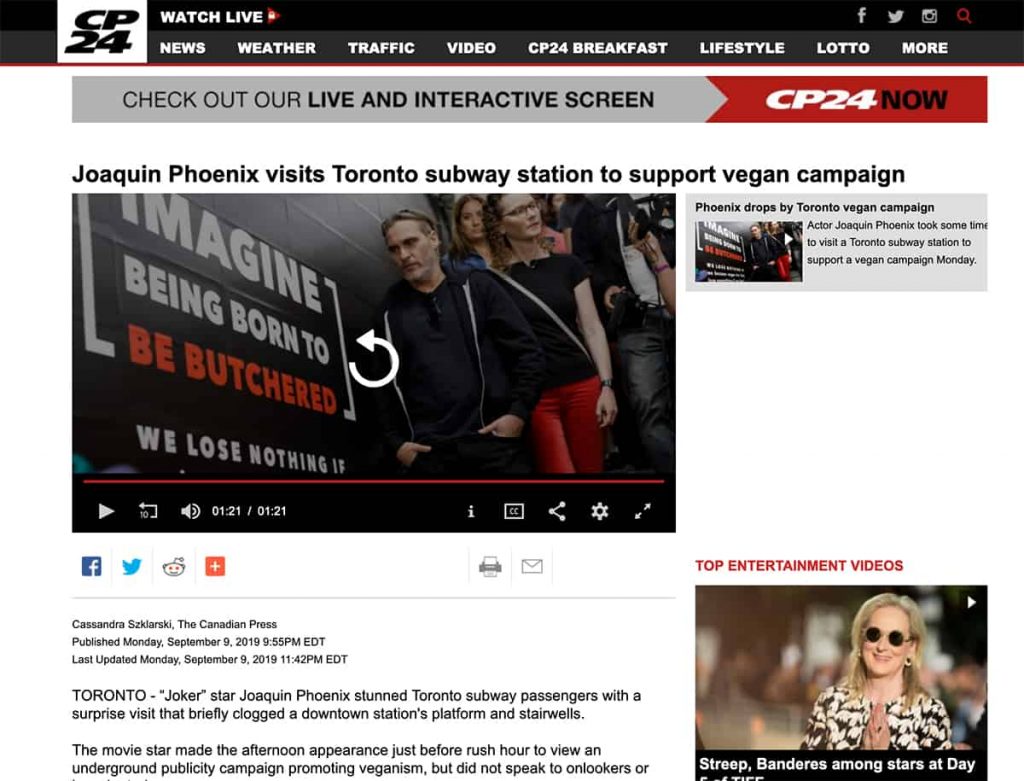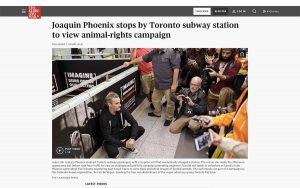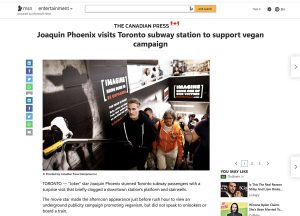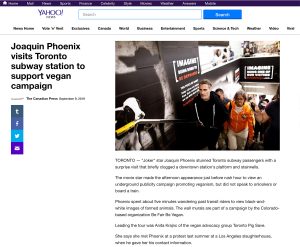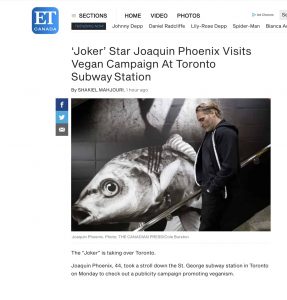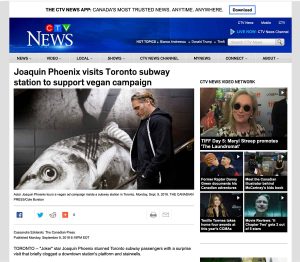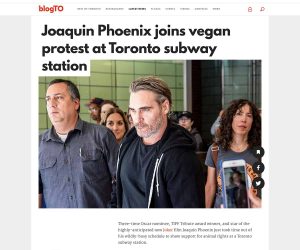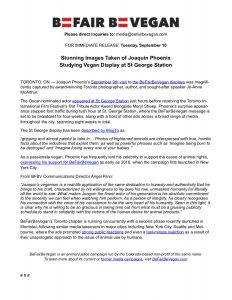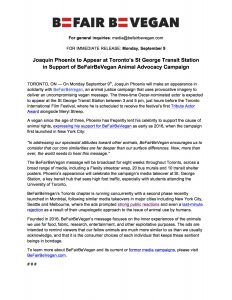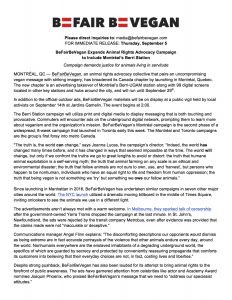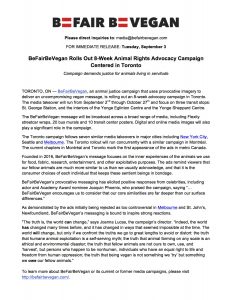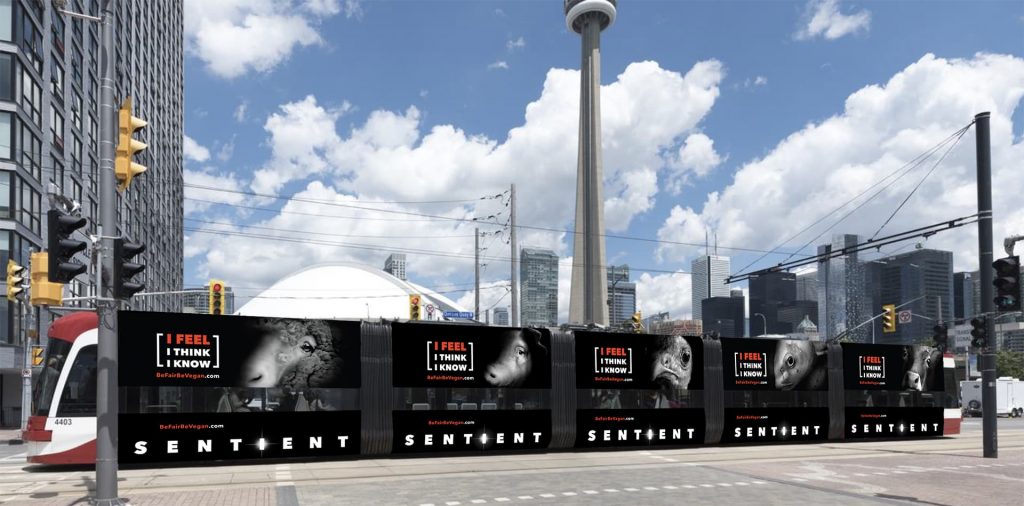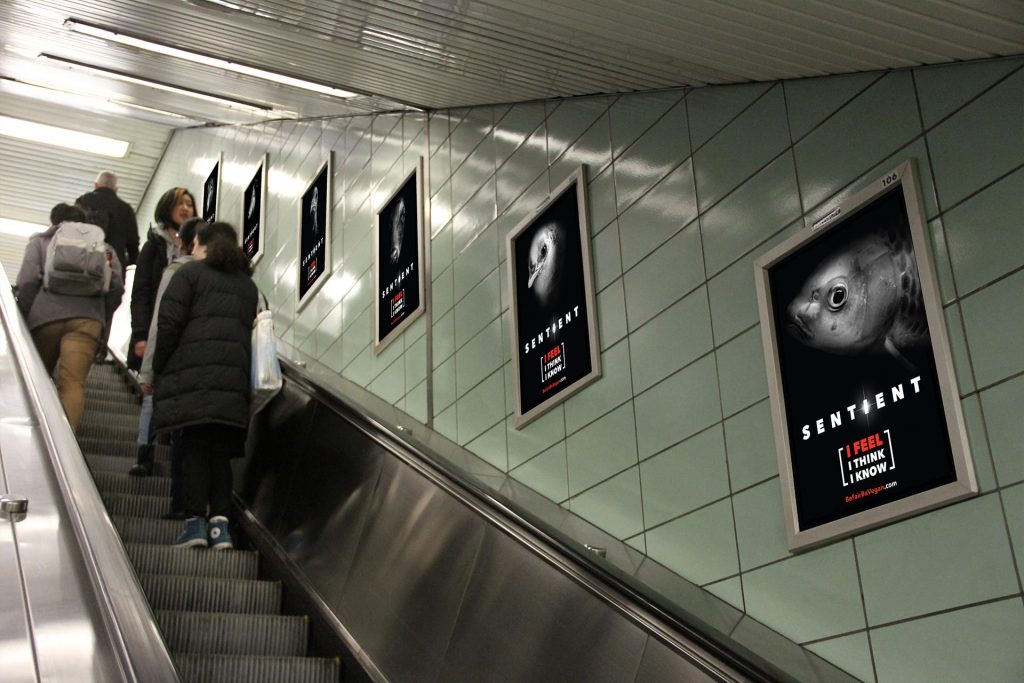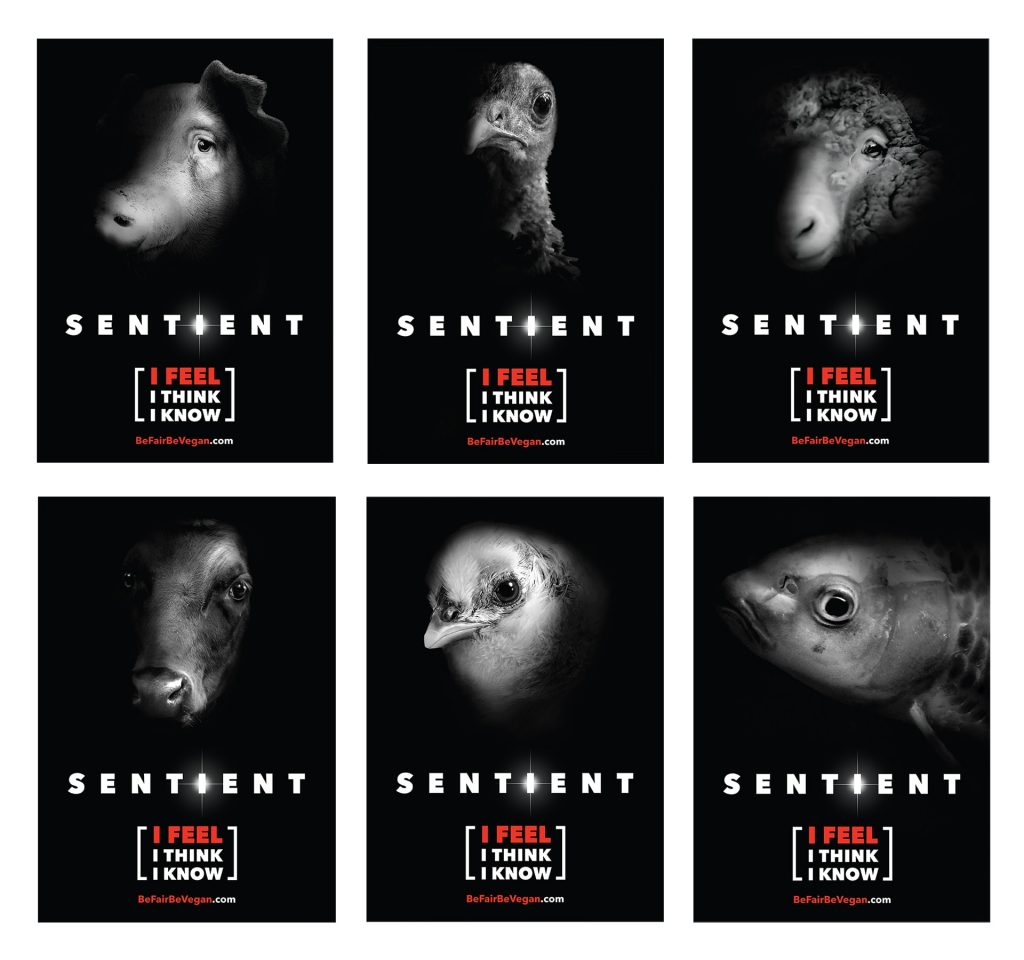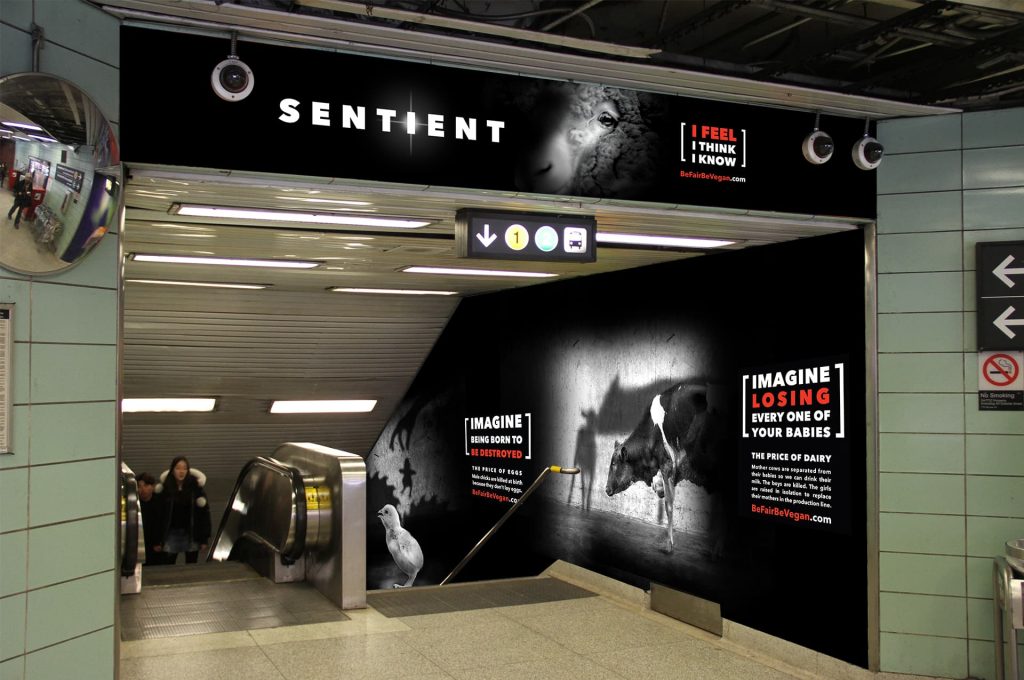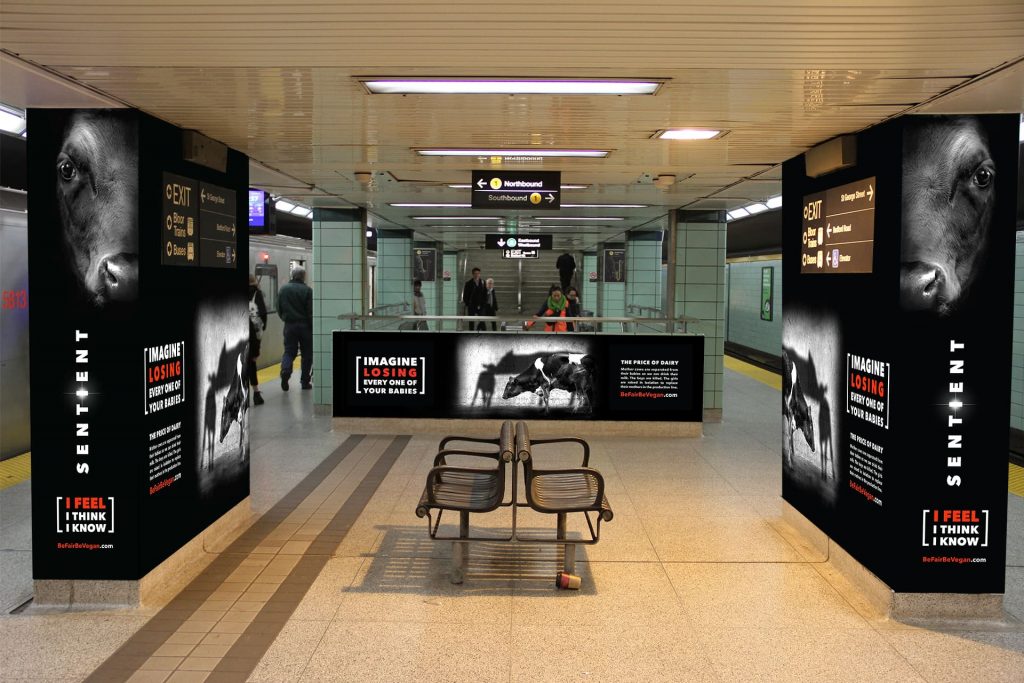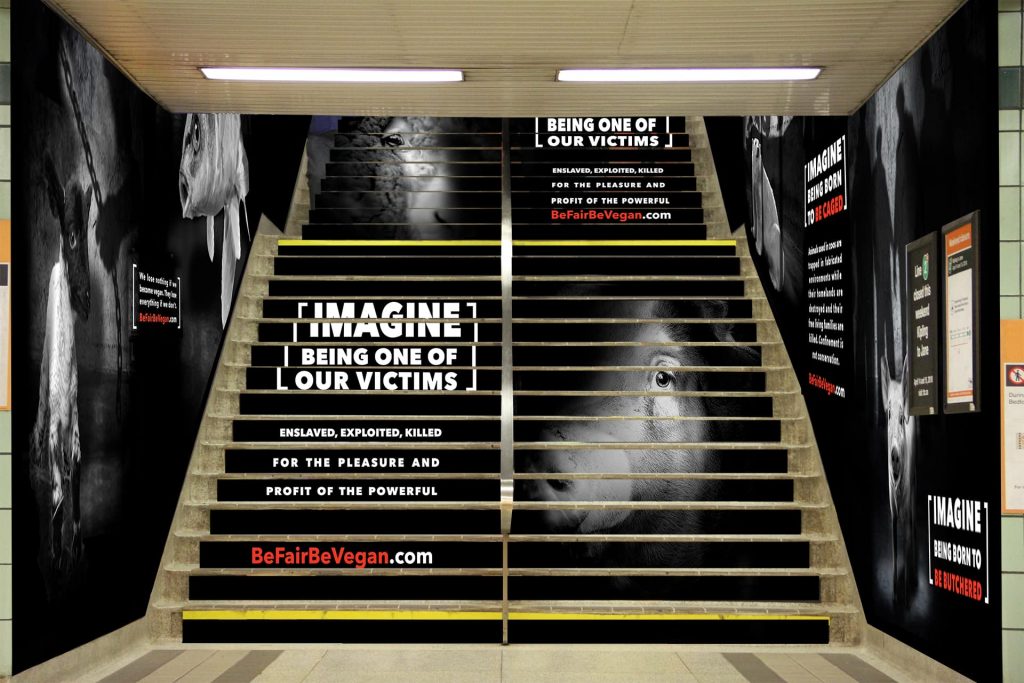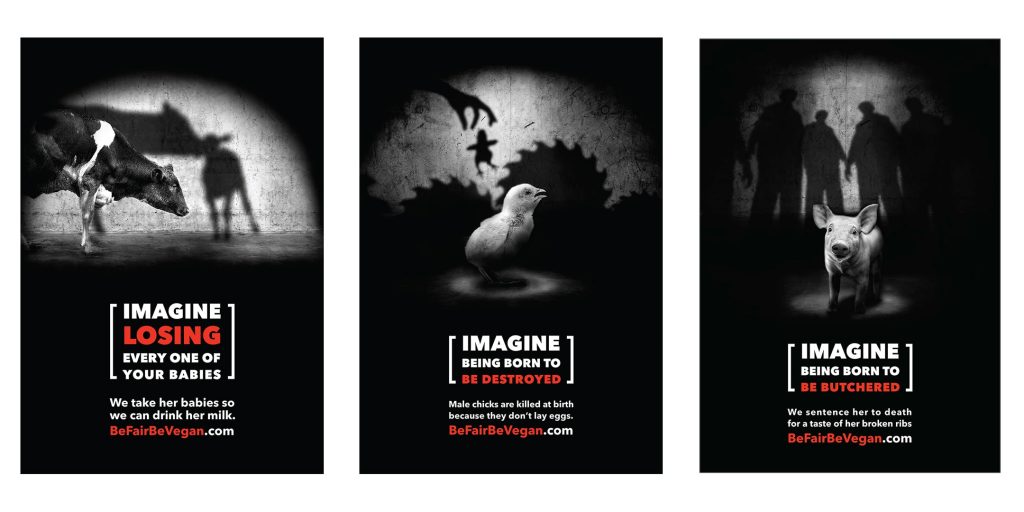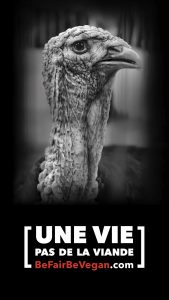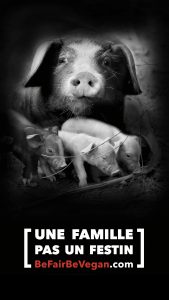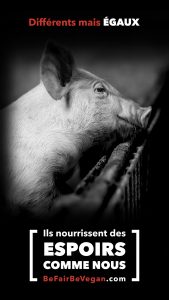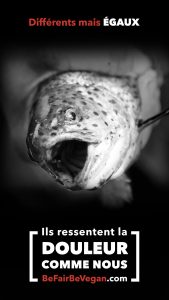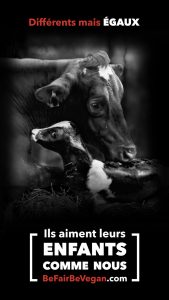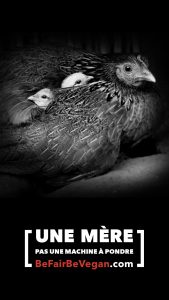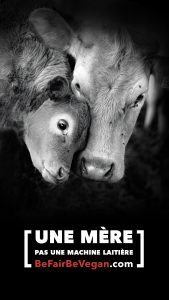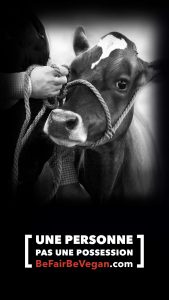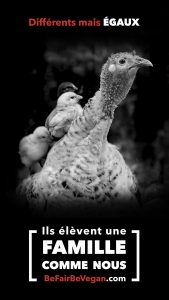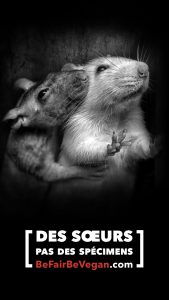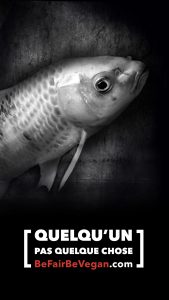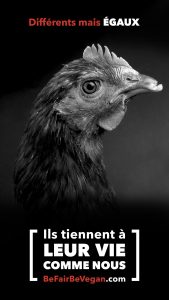BeFairBeVegan
BeFairBeVegan is an animal justice campaign run by the Colorado-based non-profit of the same name. The first high-profile vegan campaign in the US to present the end of all animal use as a prerequisite for a fair and just society, it was launched in New York City in August of 2016. Created and designed by Joanna Lucas, it is managed by a collective of vegan activists.
BeFairBeVegan brings awareness to its mission through large-scale public advertising campaigns in major cities in the US and around the world. The organization’s provocative messaging has elicited responses from notable celebrities, including actor and Academy Award nominee Joaquin Phoenix, who praised the campaign saying,
“In addressing our speciesist attitudes toward other animals, BeFairBeVegan encourages us to consider that our core similarities are far deeper than our surface differences. Now, more than ever, the world needs to hear this message.”
Joaquin Phoenix stops by Toronto subway station to view animal-rights campaign
Photos by Jo-Anne McArthur
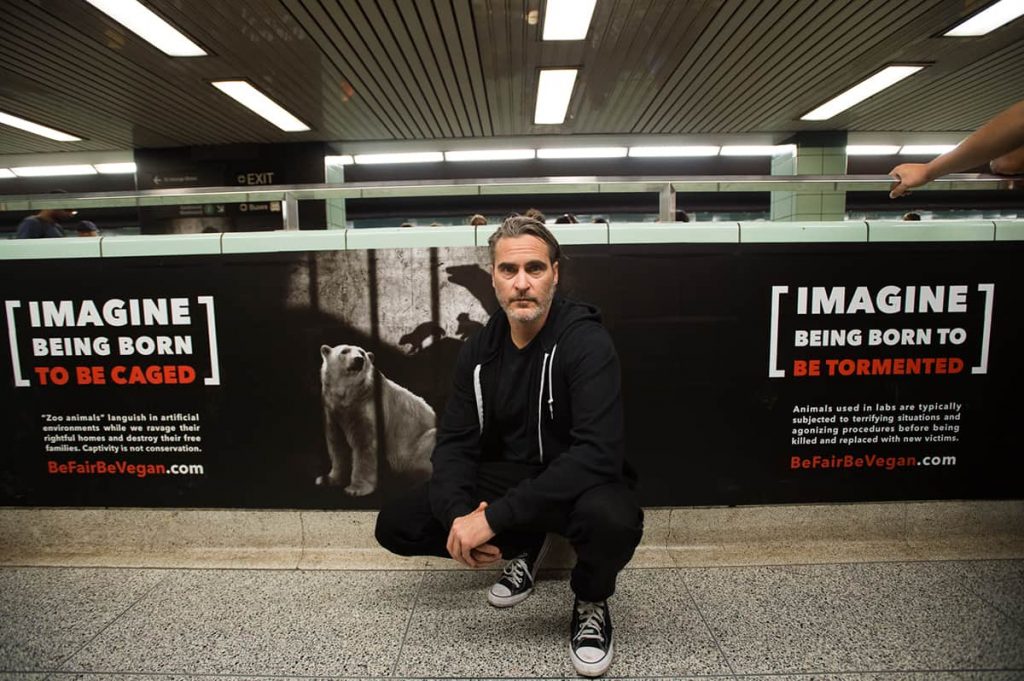
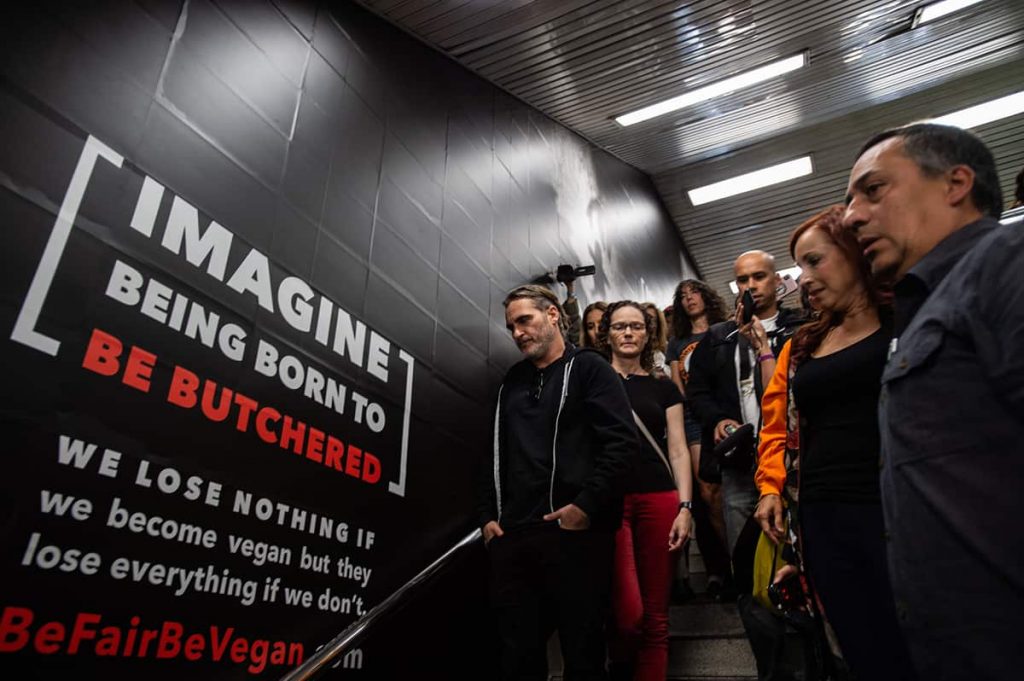
Recent Media Coverage
Recent Releases
About our Founder and Director
Joanna Lucas is a passionate advocate for a world where the rights of all sentient individuals are recognized and acknowledged. A designer by profession, she marries an eye for the artistic with her unflinching approach to activism.
Prior to her work with BeFairBeVegan, Lucas was well-known in the animal rights world for her poignant and tender essays unmasking the inner lives of psychologically-scarred individuals living in sanctuary after being rescued from animal slavery operations.
Past Campaigns
Launched in New York City in August of 2016, the organization’s first chapter featured the unveiling of a stunning moving billboard in the heart of Times Square, displaying an uncompromising vegan message illustrated with striking imagery.
Since the launch in NYC, similar chapters have gone live in several key locations worldwide, prompting strong public reactions with their unapologetic approach to animal rights advocacy:
- Hobart, Australia
- Melbourne, Australia
- St. John’s, Canada.
- Fairfield, CT, United States
- Seattle, WA, United States
- Cleveland, OH, United States
With simultaneous chapter launches in Toronto and Montreal, 2019 marks BeFairBeVegan’s first appearance in metropolitan markets of Canada.
Approved Quotes
The following quotes are approved for use in publication.
From Joanna Lucas, BeFairBeVegan’s Director:
"The truth is, the world can change. Indeed, the world has changed many times before, and it has changed in ways that seemed impossible at the time. The truth is, the world will change, but only if we confront the truths we go to great lengths to avoid or distort: the truth that humane animal exploitation is a self-serving myth; the truth that animal farming on any scale is an ethical and environmental disaster; the truth that fellow animals are not ours to own, use, and ‘harvest', but persons who happen to be nonhuman, individuals who have an equal right to life and freedom from human oppression; the truth that being vegan is not something we ‘try’ but something we owe our fellow animals.”
“When confronted with the fundamental injustice inherent in all animal agriculture—a system that is predicated on inflicting massive, intentional, and unnecessary suffering and death on billions of sentient individuals—the only ethical response is to strive to end it, by becoming vegan and helping others to do the same.”
"Being vegan means not only having the understanding that harming others is wrong, but acting on that understanding by refusing to harm ALL animals, not just the ones we meet face to face, but the ones we never get to see, the invisible ones who are bred and butchered for products none of us needs. Becoming vegan frees us from prejudice and denial, and from the soul-killing practice of violence. It frees us to act on our deeply held values of justice and compassion, to follow the road back to our true humanity, a road that starts with one simple act of conscience, and the will to act on it.”
“When we know, but choose to forget, that the individual whose soul, whose face, whose mind once enlivened the piece of ‘meat’ on our plate was like us in every morally relevant way; when we know, but choose to forget, that the bird whose life we obliterated for a bowl of soup was a fellow mortal, a flawed, frightened, mysterious being who loved life and clung to it as desperately as you and I do; when we know, but choose to forget, that the mother whose babies we steal for a glass of milk grieves their loss as any mother would, it's hard to claim that there is much left of our humanity.”
From Angel Flinn, Communications Manager:
“Our displays invite the public to look more closely at the eyes and faces of the animals we prefer to ignore, and to recognize just how profoundly these individuals experience life. They are intentionally confrontational, compelling the viewer to take an honest look at her own prejudice, and bringing her face to face with the consequences of nonvegan choices; consequences most are adamantly opposed to acknowledging, usually conveniently hidden behind factory and slaughterhouse walls, ag-gag laws, and the unwavering intractability of our own denial.”
“No one likes to think about the impact their non vegan choices have on our fellow animals, because to do so requires that we give serious consideration to the question of whether such choices are justified, at a time when there are vegan alternatives available for all of them. BeFairBeVegan aims to remind viewers that other animals, like human animals, feel not only pain and pleasure, but fear, grief and love. These telling photographs of the animals we enslave, captured in milliseconds in circumstances we will never know, for reasons we will never know, are in these ads blown up larger than life, inviting us to see the individuality in their faces, the depth of feeling in their eyes, and by extension, the despair and desperation in their minds and hearts.”
“It is possible to be almost be caught off guard by these images, because they demonstrate so clearly that the faces of those we disregard as being too different to matter are, in fact, a mirror of our own. To our surprise we find that we are not bearing witness to the experiences of strangers: alien creatures belonging to a foreign world incomprehensible to us, but into the lives of our own kind. Like the dogs, cats, and other nonhuman ‘companions’ we have historically allowed into our families, we find that the animals we keep behind bars and fences are similarly familiar, should we allow ourselves to recognize them as, like us, animal.”
“In order for consumers to be provided with everything that we obtain from the pillaging of their bodies, we subject the animals we use to both physical and psychological torment, including the separation of every mother from child after child, the ravaging of genitals, wombs and mammary glands, and the mutilation of any body parts that get in the way of profitability. All of this begins with artificial insemination at the hand of a stranger, and ends with the brutality of slaughter and the savagery of systematic dismemberment when the individuals in question are still, for the most part, the equivalent of young adults or children in human terms.”
“Contrary to what has recently become popular belief, the horror that is animal exploitation does not just apply to animals living on feedlots, in factory farms, or in other intensive captivity situations. The discomforting descriptions that our opponents would dismiss as being extreme are in fact accurate portrayals of the violence that other animals endure every day, around the world. Nonhumans everywhere are the enslaved inhabitants of a degrading underground world, the specifics of which are guarded by secrecy and protected by conveniently reassuring propaganda that comforts its customers into believing that their everyday choices are not, in fact, costing lives and liberties.”
Toronto:
Montreal:
